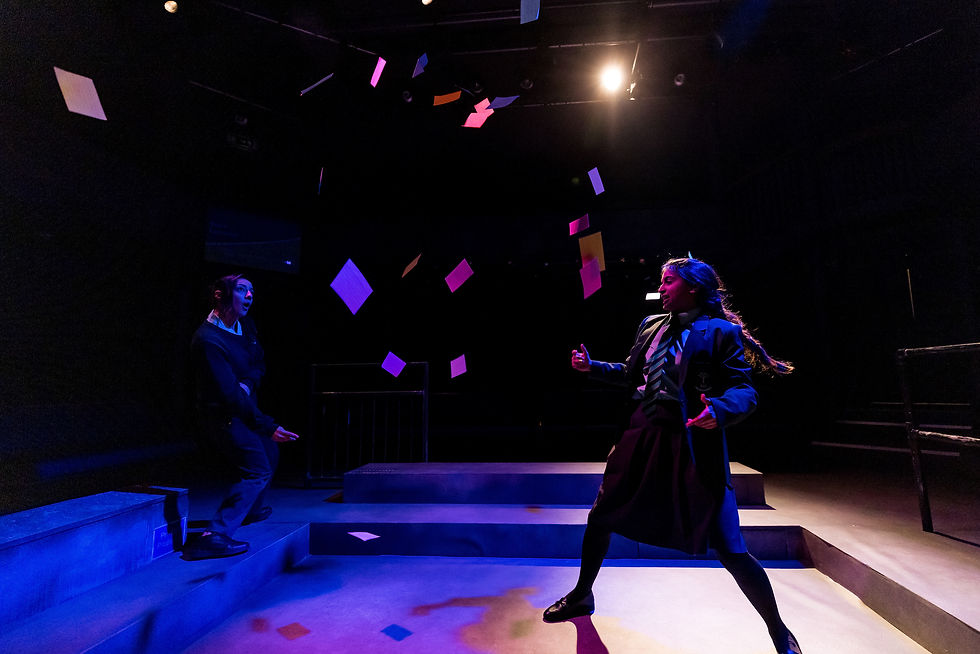Review: Two Billion Beats (Orange Tree Theatre)
- All That Dazzles

- Jan 27, 2023
- 4 min read
Review by Harry Bower
Picture the scene: I’m sat on the train returning home from the Orange Tree Theatre in Richmond. A 45 minute journey during which my head is spinning with thoughts of Gandhi, Quavers (the crisp), suffragettes, strawberry laces, memories of being bullied as a child, love hearts, racism and islamophobia, and of a hamster spinning on its wheel.
Two Billion Beats, a one-act play by Sonali Bhattacharyya, is the show responsible for this contextually appropriate but pretty random selection of thoughts.

Set mostly in a bus stop in Leicester we are introduced to Asha and Bettina, two sisters with very different attitudes and two very different experiences. Asha is the smart, seemingly confident overachieving one, and is played with a real sense of quiet vulnerability by the brilliant Shala Nyx. Bettina the endearing and often unfortunately taken-advantage-of one, embodied by Tanvi Virmani in the most sympathetic of ways.
The lights go down and we begin to see the state of the pair’s relationship and hear about their daily struggles, be it the relationship with mum or being bullied on the bus; and of course the most recent exam paper grade. All this is told via the prism of day to day interactions, either waiting for the bus or spending time in detention washing off graffiti from a wall.
The overarching narrative is woven together in Asha’s breaking of the fourth wall, talking to the audience directly about her past or upcoming essays. The first is about B R Ambedkar and Gandhi and the battle between ideologies the pair had in the 1930s. The second is about suffragettes; the life of Sylvia Pankhurst. During these monologues to the audience the character is marching around the stage illustrating the differences in opinion between these personalities and forming her own opinion of what is right and what is wrong.

Asha is given the perfect opportunity to take her own direction when Bettina opens up and admits she’s being bullied for lunch money by some school kids. It’s this story which forms the parallel, Asha learning more about her political beliefs and ideals as she simultaneously grapples with how to help her sister.
Now, if that sounds a little heavy, maybe that’s because it is. Fortunately these themes are paired with dark humour and framed in a young modern context which makes them accessible even to those with no knowledge of the subject matter – even if a handy explainer is provided in the programme.
Our two sisters are the only characters on stage throughout (unless you count the hamster) and do a commendable job of captivating the audience who are sat in the round. To involve all sides of this intimate space, including those on the balcony demonstrated real skill. The set, too, was impressive; minimal and basic in colour which allowed props to be both impactful and memorable, and it was used intelligently by the directors to ensure things were never left stale or dull. Some technology woven into the set and intelligent placement of speakers added value to what would otherwise be standard sound design.

Because of the minimal set, small cast, and in-the-round format, transitions and monologues could have been jarring or uncomfortable for the audience. It is thanks to Alex Fernandes’ lighting design that this isn’t the case, and it deserves kudos for being both subtle and impactful.
The actual performances of the actors on-stage are accomplished. You don’t realise that until the very end of the show Shala Nyx (Asha) is literally on-stage every second. They demonstrate a superb understanding of how to keep an audience engaged in even the most understated moments in the narrative, and play the moody repressed teenager well. Tanvi Virmani (Bettina) shines in a way which would horrify their shy and nervous character; portraying a whole rollercoaster of emotions set against the consistency of their sister. Not just does Virmani need to play the light relief, they also need to play the victim. And in some ways, the antagonist, too. They do a superb job of juggling those roles and allowing the space for their counterpart to explore the deeper more complicated questions.

The writing style throughout is sharp, laced with humour, and real. It’s not difficult to imagine these conversations happening in playgrounds around the country. And in a way, that’s what makes it so good. By framing complex theological and societal questions in an accessible way – and often in an idealistic and simplistic way (the eyes of somewhat naïve young people) – the audience is left to make up its own mind.
Oh, and by the way – it’s also full of joy! One scene in particular shows us the sisters in childish delight through a dance, celebrating the resolution of one of their struggles. It had the entire audience giggling, and there were plenty of other laugh out loud throwaway comments, moments, or glances.
Two Billion Beats features two characters, two stories: but many, many messages. Even with the key historical figures and their controversies set aside, it tells of school bullying. Islamophobia. Racism. Sibling and family relationships. Unconscious bias in teaching. The lack of action taken by the public when they encounter something they know is wrong. All these things and more challenge its audience to not just sit back and enjoy the show, but to engage with its content and themes.

This is a show which wants to make an impact. It’s educational. It’s fun. It is both thought provoking and intelligent and stops short of being patronising. It’s a show with something to say.
It’s just asking that we listen.
★★★★
Two Billion Beats plays at Orange Tree Theatre until 4th February. Tickets from https://orangetreetheatre.co.uk/whats-on/two-billion-beats
Photos by The Other Richard










